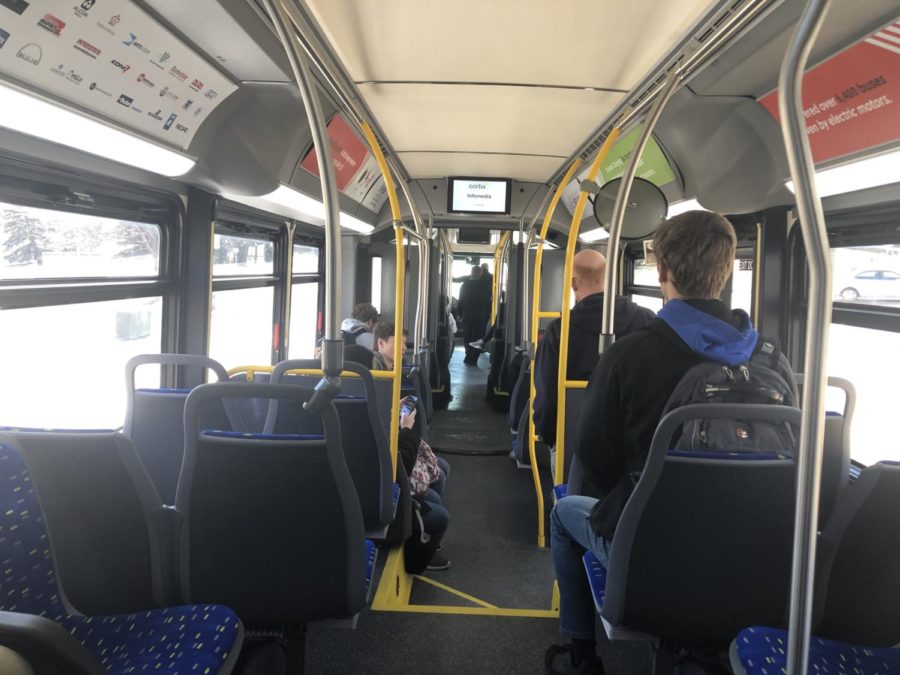Transportation adjustments for students during the COVID-19 pandemic
September 7, 2020
Iowa State made an announcement July 10 to confirm that the university would hold fall classes in three different formats: face-to-face, online and hybrid. Following the university’s announcement, other campus amenities followed accordingly.
In March, CyRide began disinfecting buses using a battery-powered backpack sprayer containing Ecolab FaciliPro. During the summer, CyRide worked hard to come up with ways they could keep passengers safe while they are on the bus.
The assistant director of operations at CyRide, Christine Crippen, said they had spent a large part of the summer looking at how air flows in the bus through Computational Fluid Dynamics.
“CyRide was able to find out that when the windows and vents are shut, the air exchanges within 93 seconds,” Crippen said. “But since the bus doors are continually opening and closing, the air exchange happens fast, which allows fresh air into the bus.”
Crippen said even if there is someone on the bus who might be sick, chances are you will not breathe in their air because air is being exchanged.
Crippen also explained that there are roof vents on top of the buses. These roof vents can be set so that they are able to catch air and push it down into the bus. The air that is in the bus tends to go out through the door as the bus is in motion since the doors are not airtight.
The director of transit at CyRide, Barbara Neal, said if all the windows and vents are open, the air is exchanged every 20 seconds, and if windows and vents are not open, then it is 90 seconds. So the air exchange is usually within 20 to 93 seconds.
Neal said they are working to monitor their ridership load to ensure they are lower than usual. Neal also said they just recently discovered that less than 1 percent of buses have more than 30 people on it at any time, meaning the majority of bus trips have less than 10 passengers on them.
Neal went on to say that the buses in which the number of passengers was a little bit higher were on the 23 Orange Route. These buses tend to be articulated buses, so the capacity limits on those buses are based on the bus’s size.
Neal said the highest number of passengers they have had on the articulated bus, which can typically carry 90 to 95 passengers, has been 70 people. She went on to say the bus reached that amount on the first day of classes, Aug. 17.
Crippen said bus drivers are wiping down buses every time they make a trip across town and also when they get to their starting and ending spot. Crippen also added that it is required that everyone wears a mask on the bus unless there is a medical reason for not wearing one.
Neal also said that the risks in riding the CyRide is not any bigger of a risk than students and community members doing other public activities.
“The risks of riding the bus are no greater than doing anything else,” Neal said.
However, Somerle Rhiner, a junior in sociology, said the risk is not worth it.
Rhiner said she finds it more convenient for her to drive on campus because she does not want to share small spaces with people unless she has no other choice.
Rhiner said she gets worried about COVID-19 when she thinks about the number of people that she comes into contact with daily. But through all of this, she said she is more afraid of giving other people the virus if she were to catch it.
“Although there are rules asking people to wear masks, they are not effective enough,” Rhiner said. “People are on campus and even getting on the bus without a mask on.”
Rhiner said she understands that not everyone has a car or can afford an Uber, so they depend on the buses as their form of transportation. She said the university needs to do its job to protect these students.
Rhiner said she had gotten one ticket from the ISU Parking Division as of right now. She said she will continue to drive her car on campus and risk getting a ticket.
“I would rather get a parking ticket than catch COVID-19,” Rhiner said.
Mark Miller, the director of parking, said the procedure for giving out parking fines is the same as it always has been.
Miller said the university revenue is down compared to previous years. Miller also said there is money being lost in the meter revenue, and fewer fines are being written because there are more places on campus for people to park legally.
“The parking ticket sales are low this year because there was a decrease in residence halls parking passes and also the fact that there has been a decrease in the number of cars parked at the stadium,” Miller said.
Miller also said the commuter lot ticket sales had been relatively the same, but the number of cars on campus in those certain lots does not match the ticket sales. Miller said this could be because people are trying to limit the number of times they are on campus, so, more than likely, people come on campus once or twice a week.
Miller said they do not receive tuition or state dollars, so all the money they make comes from tickets, fines and meter revenue. He said this money helps the department do renovations such as building new parking lots. However, since the revenue is down this year, that might not be possible.

















